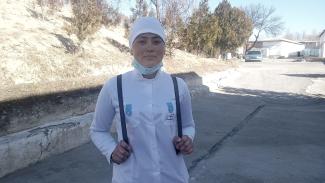At the tender age of 17, Zulfiya Ergasheva from Tajikistan’s Panjakent stood up for her constitutional right to education after recovery from tuberculosis. Zulfiya Ergasheva had always dreamed of wearing white scrubs and helping people recover from disease. On a serene autumn day in September 2019 in Tajikistan’s mountainous Panjakent, Zulfiya was celebrating her first month in the nursing department of a local medical college. However, her spirit was broken when she noticed her health was deteriorating. Zulfiya experienced a severe loss in energy and strength, and she started to suffer from symptoms similar to those her brother had felt— cough, weight loss, and night sweats. Zulfiya’s brother, Ismoil, was being treated for drug-resistant tuberculosis at the time. Zulfiya went to see a doctor and after a series of tests, was also diagnosed with drug-resistant tuberculosis.
“I was able to enjoy student life only for a few weeks,” Zulfiya says.
In early October 2019, she had to leave the college to begin treatment at the Dehmoy Regional Tuberculosis Center.
Following two months of inpatient treatment, Zulfiya continued her treatment at home . After 18 months of treatment, doctors told Zulfiya she was cured and could no longer transmit TB to others. “I have been waiting for this day for a long time. I felt very bad during my illness, but the thought of continuing my studies after recovery gave me the inspiration and energy to withstand my treatment,” Zulfiya recalls.
Unfortunately, Zulfiya’s motivation was shaken the first day she returned to college. She was expelled from the college due to her long absence from classes. The college administration did not accept Zulfiya’s sick note even though she had paid half a year’s tuition fees before she was hospitalized.
Moreover, Zulfiya was also frustrated seeing her family suffer financial difficulties. The only breadwinner of the family, her brother, was sick and unable to work, while her grandmother's meager pension and the vegetables grown in their backyard were hardly enough to keep the family of eight fed.
“I couldn’t bear the idea that I would never get an education,” Zulfiya explains.
In early 2020, the USAID Eliminating Tuberculosis in Central Asia Activity expanded its programs to the new districts in Tajikistan including Zulfiya’s home of Panjakent. USAID mobilizes community volunteers to provide psycho-social support to people affected by tuberculosis. Zulfiya and her brother were amongst the first beneficiaries included in the USAID’s social support program in their district.
One of the activity outreach workers, Ahmadjon Obloqulov, marshalled efforts to advocate for Zulfiya’s return to college. With support from Ahmadjon and other outreach workers, Zulfiya’s request to be reinstated as a nursing student reached the relevant state bodies, including the National Tuberculosis Program and the Ministry of Health and Social Protection of Population. Ahmadjon also helped Zulfiya to write a letter to Tajikistan’s Minister of Education and Science to request support in resolving her case.
Thanks to Ahmadjon’s efforts, Zulfiya’s case was covered in an article in a well-known local online magazine called Farazh. Entitled “Is Tuberculosis or Absence the Reason for the Student’s Exclusion from the College?” the article brought attention to discrimination against people affected by TB.
“Since she hadn’t been attending classes for almost three months and was sick with tuberculosis and, perhaps, would have passed it on to others, we decided to expel her from college,” explained the college director in an interview with Farazh.
Upon request of the Ministry of Health and Social Protection of Population, the college’s management reinstated Zulfiya as a student in their nursing program. As a result, on September 1, 2021, Zulfiya was back at her medical college as a first-year student.
Following her first full semester, Zulfiya started an internship at the Panjakent TB Center. She has also received an offer from the head of the TB Center to work there as a medical nurse when she graduates.
“I am immensely thankful to people from the USAID activity. With their help and guidance, the impossible became possible: I got a second chance to make my dream come true,” Zulfiya concludes with a smile, showing her eagerness to succeed.
Since June 2020, the USAID Eliminating Tuberculosis activity provided technical support to the National TB Program in detection and enrollment in treatment of 250 people with the drug-resistant tuberculosis in 18 pilot districts, of which 87 percent (217 people) received psychosocial and treatment adherent support from the social workers and volunteers.


